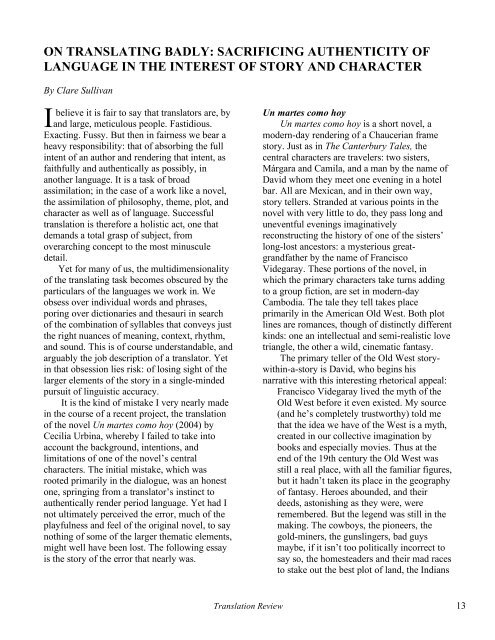table of contents - The University of Texas at Dallas
table of contents - The University of Texas at Dallas
table of contents - The University of Texas at Dallas
Create successful ePaper yourself
Turn your PDF publications into a flip-book with our unique Google optimized e-Paper software.
ON TRANSLATING BADLY: SACRIFICING AUTHENTICITY OF<br />
LANGUAGE IN THE INTEREST OF STORY AND CHARACTER<br />
By Clare Sullivan<br />
I<br />
believe it is fair to say th<strong>at</strong> transl<strong>at</strong>ors are, by<br />
and large, meticulous people. Fastidious.<br />
Exacting. Fussy. But then in fairness we bear a<br />
heavy responsibility: th<strong>at</strong> <strong>of</strong> absorbing the full<br />
intent <strong>of</strong> an author and rendering th<strong>at</strong> intent, as<br />
faithfully and authentically as possibly, in<br />
another language. It is a task <strong>of</strong> broad<br />
assimil<strong>at</strong>ion; in the case <strong>of</strong> a work like a novel,<br />
the assimil<strong>at</strong>ion <strong>of</strong> philosophy, theme, plot, and<br />
character as well as <strong>of</strong> language. Successful<br />
transl<strong>at</strong>ion is therefore a holistic act, one th<strong>at</strong><br />
demands a total grasp <strong>of</strong> subject, from<br />
overarching concept to the most minuscule<br />
detail.<br />
Yet for many <strong>of</strong> us, the multidimensionality<br />
<strong>of</strong> the transl<strong>at</strong>ing task becomes obscured by the<br />
particulars <strong>of</strong> the languages we work in. We<br />
obsess over individual words and phrases,<br />
poring over dictionaries and thesauri in search<br />
<strong>of</strong> the combin<strong>at</strong>ion <strong>of</strong> syllables th<strong>at</strong> conveys just<br />
the right nuances <strong>of</strong> meaning, context, rhythm,<br />
and sound. This is <strong>of</strong> course understandable, and<br />
arguably the job description <strong>of</strong> a transl<strong>at</strong>or. Yet<br />
in th<strong>at</strong> obsession lies risk: <strong>of</strong> losing sight <strong>of</strong> the<br />
larger elements <strong>of</strong> the story in a single-minded<br />
pursuit <strong>of</strong> linguistic accuracy.<br />
It is the kind <strong>of</strong> mistake I very nearly made<br />
in the course <strong>of</strong> a recent project, the transl<strong>at</strong>ion<br />
<strong>of</strong> the novel Un martes como hoy (2004) by<br />
Cecilia Urbina, whereby I failed to take into<br />
account the background, intentions, and<br />
limit<strong>at</strong>ions <strong>of</strong> one <strong>of</strong> the novel’s central<br />
characters. <strong>The</strong> initial mistake, which was<br />
rooted primarily in the dialogue, was an honest<br />
one, springing from a transl<strong>at</strong>or’s instinct to<br />
authentically render period language. Yet had I<br />
not ultim<strong>at</strong>ely perceived the error, much <strong>of</strong> the<br />
playfulness and feel <strong>of</strong> the original novel, to say<br />
nothing <strong>of</strong> some <strong>of</strong> the larger them<strong>at</strong>ic elements,<br />
might well have been lost. <strong>The</strong> following essay<br />
is the story <strong>of</strong> the error th<strong>at</strong> nearly was.<br />
Un martes como hoy<br />
Un martes como hoy is a short novel, a<br />
modern-day rendering <strong>of</strong> a Chaucerian frame<br />
story. Just as in <strong>The</strong> Canterbury Tales, the<br />
central characters are travelers: two sisters,<br />
Márgara and Camila, and a man by the name <strong>of</strong><br />
David whom they meet one evening in a hotel<br />
bar. All are Mexican, and in their own way,<br />
story tellers. Stranded <strong>at</strong> various points in the<br />
novel with very little to do, they pass long and<br />
uneventful evenings imagin<strong>at</strong>ively<br />
reconstructing the history <strong>of</strong> one <strong>of</strong> the sisters’<br />
long-lost ancestors: a mysterious gre<strong>at</strong>grandf<strong>at</strong>her<br />
by the name <strong>of</strong> Francisco<br />
Videgaray. <strong>The</strong>se portions <strong>of</strong> the novel, in<br />
which the primary characters take turns adding<br />
to a group fiction, are set in modern-day<br />
Cambodia. <strong>The</strong> tale they tell takes place<br />
primarily in the American Old West. Both plot<br />
lines are romances, though <strong>of</strong> distinctly different<br />
kinds: one an intellectual and semi-realistic love<br />
triangle, the other a wild, cinem<strong>at</strong>ic fantasy.<br />
<strong>The</strong> primary teller <strong>of</strong> the Old West storywithin-a-story<br />
is David, who begins his<br />
narr<strong>at</strong>ive with this interesting rhetorical appeal:<br />
Francisco Videgaray lived the myth <strong>of</strong> the<br />
Old West before it even existed. My source<br />
(and he’s completely trustworthy) told me<br />
th<strong>at</strong> the idea we have <strong>of</strong> the West is a myth,<br />
cre<strong>at</strong>ed in our collective imagin<strong>at</strong>ion by<br />
books and especially movies. Thus <strong>at</strong> the<br />
end <strong>of</strong> the 19th century the Old West was<br />
still a real place, with all the familiar figures,<br />
but it hadn’t taken its place in the geography<br />
<strong>of</strong> fantasy. Heroes abounded, and their<br />
deeds, astonishing as they were, were<br />
remembered. But the legend was still in the<br />
making. <strong>The</strong> cowboys, the pioneers, the<br />
gold-miners, the gunslingers, bad guys<br />
maybe, if it isn’t too politically incorrect to<br />
say so, the homesteaders and their mad races<br />
to stake out the best plot <strong>of</strong> land, the Indians<br />
Transl<strong>at</strong>ion Review 13

















